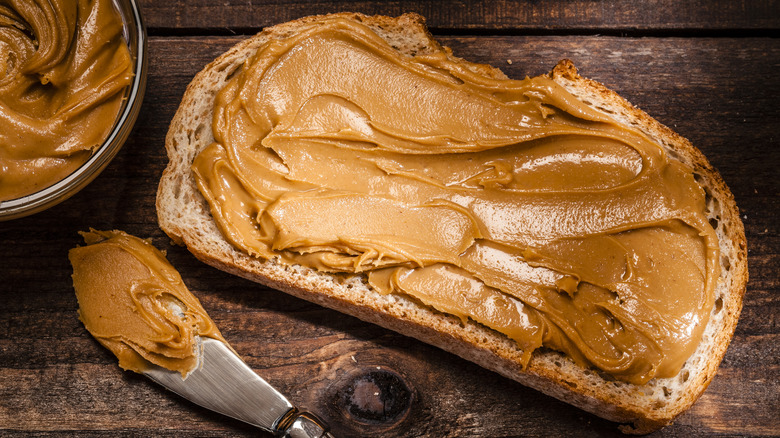Avoid Eating Peanut Butter If This Is Happening To Your Body
Peanut butter is one of those hard-to-resist breakfast foods that most people have tried at least once in their lives. For some, it's a staple in their pantry cupboard — an important ingredient to put on their toast or add to their smoothies. When you eat peanut butter for breakfast, you're starting your day right: with a good dose of protein, fiber, and healthy fats to keep you satiated and energized till your next meal time arrives. Indeed, consuming peanut butter in moderation as part of your everyday diet can be good for your health.
But while this nutty spread is considered safe for most people's digestive systems and is even recommended by health professionals when you have an upset stomach, there are times when eating peanut butter can cause diarrhea in someone. For example, for someone with food intolerances or fat malabsorption, eating peanut butter might result in an increase in bowel movement or diarrhea.
Also, people with irritable bowel syndrome (IBS) should be wary of eating too much peanut butter, as this can result in gastrointestinal discomfort. Even though this nut butter is considered low-FODMAP (fermentable oligosaccharides, disaccharides, monosaccharides, and polyols) food, some brands can contain sugars that irritate your digestive system. So if you have digestive issues and you're experiencing diarrhea, you may want to cut back or look for organic peanut butter brands and see if that helps.
A peanut butter allergy can mess with your body
An allergic reaction to peanuts can also manifest in diarrhea. A food intolerance to peanut butter, however, is going to be different from a food allergy in that your symptoms can be more than just indigestion. Peanut allergies involve an immune system response.
One of the more common food allergies out there, peanut allergies manifest in hives, redness, or swelling of the skin, itching in the mouth and throat, stomach pain, nausea, vomiting, and diarrhea, wheezing and shortness of breath, a runny nose, and feeling like your throat is closing up.
In severe allergy cases, a person can go into a state of anaphylaxis, an immune system reaction that includes a drop in blood pressure, hampered breathing, constricted airways, and dizziness. While food allergies are common when you're a kid, they can develop later in life as well. If you're allergic to peanuts, you should watch out for dishes or store-bought goods that may contain peanuts as an ingredient and even coming into contact with them via inhalation. Seek healthcare attention if you think your diarrhea is related to an allergy, particularly if it is accompanied by other symptoms. Anaphylaxis can be life-threatening.
Eating contaminated peanut butter can also cause diarrhea
While this might be a rare occurrence, there have been instances when peanut butter was contaminated by salmonella and caused diarrhea. Food poisoning can also manifest as vomiting and stomach cramps.
While most of us may not think much about consuming a spoonful of this crunchy goodness from a jar that's been sitting on our counters for awhile, peanut butter can go bad, mainly owing to its fat content. But there are telltale signs that would alert you before you could even get the stuff into your system. For starters, the nut butter would've taken on a darker color, and would smell rancid and metallic. It would also look dry. There could also be mold growing in the expired peanut butter. If, by any chance, you did miss all these signs and end up consuming some, the taste is sure to put you off — it's going to be bitter and sharp.
While a conventional bottle of peanut butter can be stored unopened in the pantry for 6 to 9 months, the more organic brands should ideally be stored in the refrigerator and would last you a whole year. When refrigerated, the non-organic kind can also last for 12 months. Once opened, both the conventional and organic peanut butter brands can be kept for up to 3 to 4 months if refrigerated.


